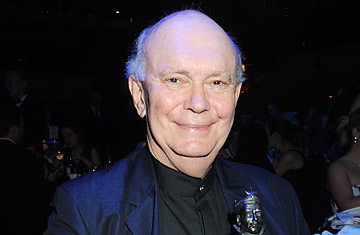
Sir Alan Ayckbourn
In the old days, Alan Ayckbourn's work used to wind up on Broadway: early, funny plays like How the Other Half Loves, Absurd Person Singular, and The Norman Conquests trilogy. More recently, several of Ayckbourn's later plays (Comic Potential, Private Fears in Public Places) and more flamboyant experiments (Intimate Exchanges, the play with 16 permutations) have been given major New York productions. In between, however, lies a vast expanse of Ayckbourn masterpieces that have rarely if ever been seen in the U.S. (Read TIME's report: "Alan Ayckbourn: Man of the Moment")
A quick guide to 10 Ayckbourn plays that deserve more attention:
1. Just Between Ourselves (1976)
Ayckbourn turned his domestic comedy several notches darker in this account of a couple's disintegrating marriage — and a husband so oblivious that he doesn't notice (or realize he's causing) his wife's emotional breakdown. One of his most daring and frightening plays.
2. Joking Apart (1978)
In a four scenes spanning a 12-year period, Ayckbourn charts the fortunes of a "perfect" married couple and their circle of friends whom they inadvertently cause nothing but misery. One of the best examples of Ayckbourn's ability to milk the bleakness of ordinary lives for extraordinary humor.
3. Way Upstream (1981)
Two unhappily married couples take a boat trip, which turns into a nightmare after a sinister hitchhiker takes command. A rare Ayckbourn play that got panned by the critics, and I have never seen it onstage (not surprising, since it requires the stage to be filled with water). But it's a thrilling read, and a rare Ayckbourn attempt at political allegory.
4. A Chorus of Disapproval (1983)
After the death of his wife, a man joins an amateur theater company performing The Beggar's Opera, and unwittingly turns everyone's life upside down. A big play (unusually long for Ayckbourn) with a large cast, but one of his most entertaining — though you couldn't tell it from the botched 1988 movie version starring Anthony Hopkins
5. Woman in Mind (1984)
A woman's fantasies of a "perfect" domestic
life turn into the symptoms of her gradual descent into madness. One of Ayckbourn's most brilliant combinations of laughter and pain — and, happily, one of of the few plays from his great period that have not been totally ignored in the U.S.; Stockard Channing starred in a good off-Broadway production some years back.
6. Henceforward (1985)
Ayckbourn's futuristic blend of A Clockwork Orange and Amadeus: In a blighted future, with gang wars raging outside, a reclusive composer buys a female robot to keep him company, while he struggles to compose his masterpiece. The thrilling 1989 London production (originally starring Iam McKellan) would be hard to duplicate — but someone should try.
7. Man of the Moment (1987)
A convicted bank robber, after serving
nine years in prison, has become a rich and famous media celebrity. A TV producer decides to bring him together with the mousey clerk who foiled the robbery. This provocative and prescient satire of the distorting mirror of reality TV would seem made to order for American audiences. Alas, nothing doing.
8. The Revengers Comedies (1989)
A man and woman meet on London's Albert Bridge and plot to "exchange" murders. She goes after his hated boss, then expects him to bump off her rival in love. This epic updating of Hitchcock's Strangers on a Train is hampered by its two-play length, but it is Ayckbourn at the very top of his game.
9. Wildest Dreams (1991)
A group of friends gather regularly to play a Dungeons and Dragons-style roleplaying game, which gradually takes over their lives. One of Ayckbourn's darkest plays — one character regresses to infancy before our eyes — unjustly neglected since its 1993 London premiere at the Royal Shakespeare Company.
10. Time of My Life (1992)
One of Ayckbourn's most complex
experiments with time: A family celebration at a restaurant becomes a three-part fugue: one couple is followed in real time for the next two hours; another's story moves forward two years; a third moves backward in time for two months. I've never seen it staged (though Chicago's Steppenwolf gave it a try some years back), but it reads like a dream.
Read TIME's report: "Louisville: Where New Plays Go to Be Born
